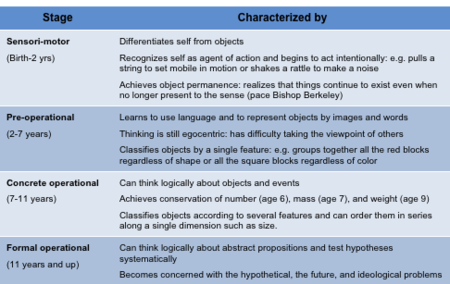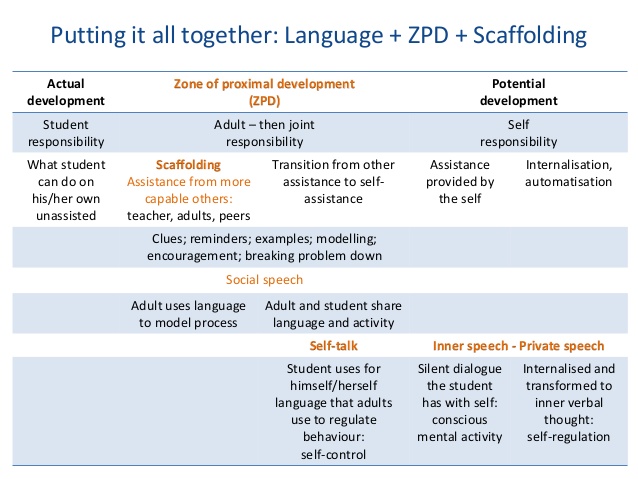Cognitive Development
This focuses on how people process thought and observes patterns in thinking throughout the lifespan.
This focuses on how people process thought and observes patterns in thinking throughout the lifespan.
- Cognitive development and brain development differ in that cognitive development discusses the abstract nature of thought that is not monitored scientifically, or is not black and white. Brain development deals with the physical structure and growth of the brain, its neurological processes and capabilities.
- Piaget's theory focused on the concept of knowledge itself, observing how individuals come to acquire knowledge and how they put that knowledge into use. According to Piaget, cognitive development is a balance of physical maturation and interactions with the environment seen through organization and adaptation. He placed a strong emphasis on the importance of development during childhood, believing that children understand the world around them through making assumptions and drawing similarities between what is already known and what they witness from others.
- An individual's organized thought structure is known as a schema, which is highly personalized to each individual.
- The theory is split into four stages, shown in the above figure. These stages are sensorimotor, preoperational, concrete operational, and formal operational. The stages are further explained in the figures below.
|
Lev Vygotsky- Sociocultural Theory
|
David Elkind- Adolescent Egocentrism
- This theory refers to adolescents' trouble distinguishing between their perception of what others think about them and what people actually think in reality. This is seen through three ideas, the imaginary audience, the personal fable, and the invincible fable.
Benjamin Bloom- Bloom's Taxonomy
- This theory was developed by a committee of educators, lead by Bloom, which created a taxonomy that sought to classify multiple educational priorities. A taxonomy is a way of classifying specifics into organized categories.
- This theory sought to provide educators with a more well-rounded form of education, focusing on three specific domains of cognitive, affective, and psychomotor.
Personally >
I experienced Elkind's "Adolescent Egocentrism" quite strongly when I was in middle school. I was homeschooled for elementary school, and upon entering a public middle school in seventh grade, I was not prepared for the influx of social oddities. Even basic stuff like walking down the hallways with many classmates around me triggered the "imaginary fable," or belief that everyone was judging me because I didn't have the latest Abercrombie jeans on. Thankfully, I grew out of this.
In the Future >
Understanding cognitive development is important for a future educator, because each student develops his/her thinking in a unique way. It is a combined effort of cultural and social influences, combined with personal past experiences. The empathy that comes from remaining open-minded allows for better conversation in the classroom, and more personalized learning expectations for all students.
I experienced Elkind's "Adolescent Egocentrism" quite strongly when I was in middle school. I was homeschooled for elementary school, and upon entering a public middle school in seventh grade, I was not prepared for the influx of social oddities. Even basic stuff like walking down the hallways with many classmates around me triggered the "imaginary fable," or belief that everyone was judging me because I didn't have the latest Abercrombie jeans on. Thankfully, I grew out of this.
In the Future >
Understanding cognitive development is important for a future educator, because each student develops his/her thinking in a unique way. It is a combined effort of cultural and social influences, combined with personal past experiences. The empathy that comes from remaining open-minded allows for better conversation in the classroom, and more personalized learning expectations for all students.







